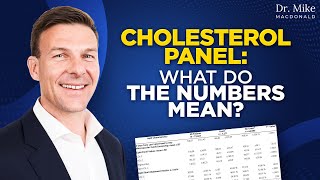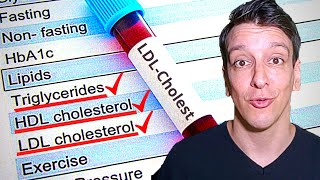
Cholesterol blood test: What do the numbers mean? Your lipid panel results explained.

This is part of a series so if you have questions these will be answered in additional videos.
CHAPTERS
00:00 – Intro
00:15 – Standard components of a lipid panel
00:37 – Measuring units mmol/l and mg/dl
01:16 – Total cholesterol
01:40 – Triglycerides
02:26 – HDL-Cholesterol and LDL-Cholesterol
02:33 – LDL – cholesterol – how it is calculated – and direct measurement
03:17 – Chol/HDL ratio and Non-HDL cholesterol
03:43 – Apolipoprotein B, LDL-particle count and LDL particle size
05:12 – Heart disease risk, particle size and concentration
We go through:
Total cholesterol
LDL – cholesterol
HDL – Cholesterol
Triglycerides
ApoB
LDL-P
Non-HDL cholesterol
If you are interested in learning more about cholesterol, and its management you can join the waitlist for my upcoming course at the following link:
https://drmikemacdonald.com/cholesterol/


Hi bro I searched from fiverr, Can I make YouTube thumbnails for your channel in just $10?
Love your work.
Very Good!
the total cholesterol lvl should be between 150 to 200, but in my case its 118. please give me some tips, which might help me out to get a normal lvl
Sir g 1.18 MMOI/l HDL CHOLESTEROL THEK HAY ?
funny enough, you are showing the lipid panel of someone likely receiving a statin….
If you pretend to show what the numbers mean, and then sticking to units and low grade technical stuff, you missed your self imposed mission.
A minimum of interpretation and reference like ACM for those values would be appreciated by many people I guess. For instance, if the total Chol is <150 then the ACM risk is sharply INCREASING. Kind of interesting, isn’t it.
Very nice. Loved it!
My LDL SMALL was above range, and the LDL LARGE was slightly below range…All other lipid numbers were very good and in range. Should I be concerned?
Bit confused. I thought cholestetol was no longer the cause of atheriosclerosis but sugar is.
Nice video
I was hoping for more on the numbers – what is bad what is good, etc.
This is great very helpful thanks
So If your apo B number is 90,……how many particles of non-hdl cholesterol would you be estimated to have? I don’t know how this works.
The final section on ApoB leaves me none the wiser on the important questions. What is a high ApoB number and what is the relevance of that number to small dence LDL or large "fluffy".
Brilliant.
So on a keto or carnivire diet , isn’t it expected that the LDL P number would go up ? The bigger the particle , the higher the LDL , correct? Is higher particle size as dangerous when it’s due to animal based diet ?
I enjoyed the video. Thanks for posting this one.
Hi my cholesterol levels are 6% is that blocked archery’s thanks
Hi Doc, Thanks for video. I hear quite a bit of talk about Triglyceride to HDL ratio being a decent marker of circulatory health with an optimum ratio range apparently between 1:1 and 1.5:1, however this always tends to come from USA based MD’s/Surgeons etc and they always state results in mg/dL. I was interested as had my Lipid panel from G.P. and Trigs were 0.93mmol/L and HDL was 0.98mmol/L, which on the face of it seems a close to optimal ratio at 0.95:1, however when I convert mmol/L for Trigs (0.93mmol/L=82.37mg/dL) and HDL (0.98mmol/L=37.9mg/dL) the ratio is not so good 82.37/37.9= 2.17:1. So my question is when they talk of that ratio as a guide are they only referring to that ratio of 1:1 as optimal when the units are mg/dL ? Thank you.
Please explain why Hong Kong, Japan and Singapore have high life span and do you think it’s due to diet?
I don’t think it’s due to healthcare since Canada and Switzerland have good healthcare but the lifespan is not as high as these asian countries.
Probably due to fish? vegetables? rice? more walking? less fast food?
Thank you
Asslam u alaikum gg Kya Hal hay g
Full disclosure, I am a recent patient of yours and I have to say you’re the best Cardiologist in Singapore (by a mile) . Your evident professionalism and passion for what you do makes you the best in town. Thank you for the video!!
Very useful. Thank you.
Hey Doc, I was told recently, that my cholesterol level was 5.65 (in Canada) but that my LDL, HDL and triglycerides were all normal. My doctor said it had something to do with how those numbers are calculated. By the way, I have been on a statin for 25+ years, so how can this be?
.. wheres the sdLDL-C?..